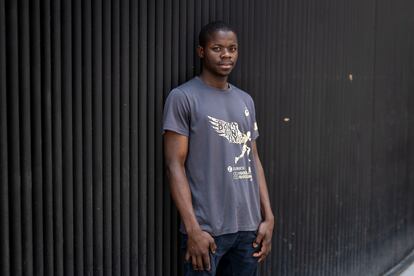A judge orders the Generalitat to protect a minor from Benin whose passport she distrusts.


Marzoukou A., a teenager from Benin living in Barcelona, is "very happy." After a complex immigration process, he has won another battle: the one he has been fighting for months with the Administration to recognize him as a minor. A judge has validated the passport issued by the authorities of the African country, which states his age as 17. Both the Prosecutor's Office and the Catalan Government had questioned the reliability of the document, but the judge reminded them that, according to Supreme Court doctrine, a passport is valid as long as no evidence of its falsification is provided.
The teenager will once again be integrated into the protection system for unaccompanied foreign minors of the General Directorate for Child and Adolescent Care (DGAiA) , albeit for a short time: he will reach the age of majority on November 26. His lawyer, Albert Parés, wants to use these months to have the Generalitat process his work permit . Marzoukou isn't wasting time: he's doing an internship as a fishmonger at Mercabarna, although his intention is to train to drive heavy vehicles. "My father, who passed away, was a truck driver, and I want to be the first in the family to follow in his footsteps," he explains in an interview with this newspaper.
He was born in Copargo, a town in the interior of Benin, and spent his childhood in a house he shared with 27 other people (his father was married to several women) until he settled in with his grandmother. “I worked in the fields or bringing water and food to the house,” he explained to the Red Cross workers who cared for him upon his arrival in Catalonia. When his grandmother died, he decided to migrate to Europe in search of “a better quality of life.” At 13, he traveled to Algeria, where he spent two years until he was able to board a small boat that took him to Almería. From there, he traveled by bus to Barcelona and presented himself, without documentation and “completely helpless,” at a Mossos d'Esquadra police station, according to the file accessed by EL PAÍS.
In June 2023, he was declared in pretrial detention and placed under the protection of the DGAiA (General Directorate of Civil Protection ), which placed him in a juvenile center in Barcelona. The technicians presented him as a tidy, clean, polite, focused young man, eager to learn, and willing to work. However, since he was undocumented, he had to undergo age determination tests conducted by the Prosecutor's Office . Widely criticized in the scientific literature, these tests showed that he was 19 (according to the wrist X-ray) or 18 (according to the orthopantomography).
With the coming-of-age decree, Marzoukou had to leave the center . She wasn't completely abandoned because she was allowed to use assistance, social integration, and healthcare resources. In the meantime, she had applied for a passport at the consulate. She received it in February 2024, when she was already in a shelter in the Zona Franca. The document certified that she was born in November 2007, making her 16 years old at the time. Parés requested that a new case be opened for abandonment, but the DGAiA (General Directorate of Human Rights) took no action . It is this administrative silence that the lawyer has challenged with a lawsuit that has been admitted by the 17th First Instance Judge of Barcelona, Elena Campos.
The Prosecutor's Office and the DGAiA (Generalitat) have opposed recognizing him as a minor because, they say, the documentation is unreliable. The Public Prosecutor's Office points out that Spain has no agreement or treaty with Benin to validate the documentation and that it is "contradictory" to the young man's "physical appearance" and medical evidence. At the hearing, the Generalitat (Catalan government) made a similar argument: although the passport "appears to be original," it does not "attest to his age." Both rely on a report that the police prepared upon his arrival in Almería, when he was mistakenly identified with another name ("Marzouk Al Hassan") and another nationality (Algerian).
“I don't understand why they said I was born in Algeria. It makes me angry that they acted this way,” says Marzoukou. Both he and his lawyer speculate that the error occurred because most of the passengers on the boat were Algerian. At the hearing, Parés pointed out that, except for the one from the Ministry of the Interior, “all the documents” (including a certificate from the Benin civil registry) always show the same date of birth. He added that, in any case, the validity of the passport prevails.
The judge ruled in her favor. Campos recalls that the Supreme Court has already ruled on how to resolve potential discrepancies between the age indicated on a document and the age "derived from physical appearance." And she concludes that, if there is a "valid passport," as in this case, it even supersedes medical tests. Although potential fraud must also be avoided, says the judge, in agreement with the high court, the priority is "the protection" of migrant minors, people who are in Spain "without family" and in "very vulnerable" situations. The judge concludes that Marzoukou has "the right to be under the protection that the law provides to unaccompanied foreign minors " and orders the DGAiA (General Directorate of Migration and Development) to issue "immediately" resolutions and measures for her protection.
EL PAÍS





